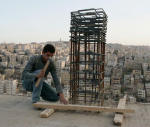You are here
Blind entrepreneur makes reading accessible for all through audio books
By Camille Dupire - Nov 11,2017 - Last updated at Nov 11,2017

Rawan Barakat provides training to teachers, mothers and community volunteers to foster a learning environment based on listening skills (Photo courtesy of Raneen)
AMMAN — When she was transferred to a mainstream school in 6th grade, Rawan Barakat was confronted with the harsh reality of the lack of educational resources in Braille and of teachers trained to deal with visually impaired students.
One hundred per cent blind herself, Barakat came up with the idea of Raneen, an initiative that seeks to encourage reading and appreciation of books through non-traditional teaching methods.
Established in 2009, Raneen (which means “ringing sound” in Arabic) produces Arabic audio books recorded in a lively dramatic way with sound effects and music, to engage children, especially those with visual impairments, to read and be involved in an interactive learning process.
“Reading can be done in many different ways, it does not have to be only visual,” Barakat told The Jordan Times over the phone, stressing the various benefits of listening skills in school curricula.
“When they listen to stories, children learn to develop their imagination, their creativity and critical thinking skills,” she continued.
Aiming to create the largest Arab audio library in the region, Barakat has already produced 5 collections of 35 audio stories published in 7,000 copies, which have been disseminated among 250 schools in the Kingdom, benefiting both Jordanian institutions and schools in Palestinian refugee camps.
Over 30,000 students aged between five and 16 years old have had access to these audio libraries in various governorates. “I would love to see the concept of listening classes being institutionalised across Jordan and replicated all over the Arab world,” the young woman said, noting that she has been working with the Education Ministry to expand Raneen’s methodology on a national scale.
Although the audio stories were initially drafted to bridge the gap of educational resources available for visually impaired children, their impact spread way beyond what she initially expected.
“Nowadays, children learn to become dependent on visual input to stimulate their attention. Therefore, they lose the ability to develop valuable skills enhanced by listening like the ability to distinguish sounds from one another, to analyse them and memorise auditory information,” Barakat explained, adding that her workshops also push children to interact with each other and learn how to express their thoughts and opinions.
During listening classes, students are fully involved in the learning process, first through discussions led by teachers or members of Raneen’s teams, then by interacting with their peers in a collaborative team work fashion.
Provided with toys, art supplies and any available medium, the students are encouraged to bring the audio stories to life in a creative learning space, thereby developing their communication and imaginative skills.
“We choose stories that convey values of respect, empathy and human rights to contribute in shaping a culture of collaboration and solidarity,” Barakat said, noting that the initiative also aims to positively influence the development of younger children’s personalities.
Raneen involves not only teachers, but also mothers and community volunteers, so as to ensure the success of the educational approach. “Mothers also need to know how to support their kids in their leaning process, and we teach them how to develop their own and their children’s listening skills,” she said, stressing that she believes communication skills should be enhanced in all settings of a child’s life.
The first visually impaired person to ever carry out a mono-drama theatrical performance, Barakat has been striving to inspire others to pursue their dreams and innovate in their own way.
“Everyone should take part in re-thinking the traditional learning environment by developing out of the box initiatives that can help include all children without discrimination,” she said.
“I grew up in a very supportive family who always empowered me to create opportunities to interact with others,” the woman, who is now a director, writer and producer of plays and documentaries, recalled, adding “no one should ever belittle you to think that you cannot do something because of a physical impairment”.
Raneen, which has partnered with numerous organisations including the Queen Rania Madrasati initative, Aramex, Arab Bank, UNICEF and Injaz, among others, has been awarded several international prizes including the King Abdullah Youth Innovation and Achievement award, the TAKREEM education award, the Ashoka award as well as the Synergos Arab Social Innovators Award.
Related Articles
Her Majesty Queen Rania on Monday engaged with students at the Shajaret Al Dur Elementary School for Girls in activities organised by the Madrasati initiative and the Raneen Foundation.
AMMAN — At the What Really Matters Congress, Rawan Barakat, 33, from Amman, shared her story, in which her parents discovered a few mo
AMMAN — Solidarity Is Global Institute (SIGI) on Sunday condemned the alleged bullying of a woman with visual impairment, who announced her
















